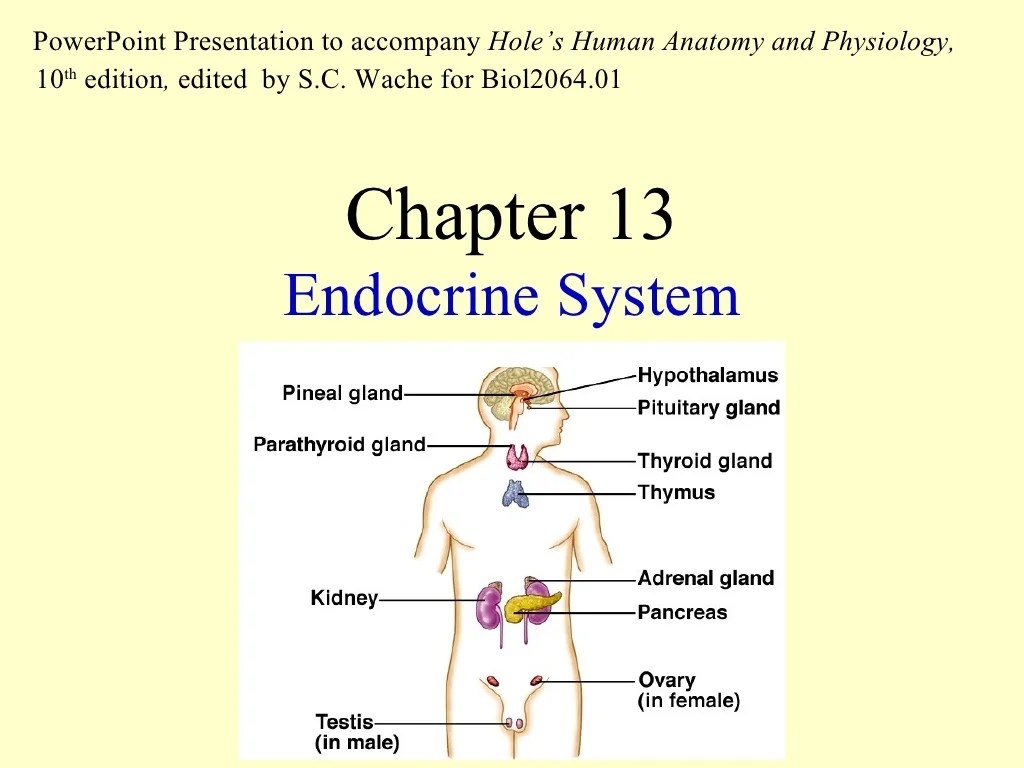Test Chapter 7:13 Endocrine System embarks on an enlightening journey into the intricate network of glands and hormones that orchestrate our bodies’ functions. From the pituitary gland’s指揮棒 to the adrenal glands’ adrenaline rush, this chapter unravels the fascinating interplay of hormones, their targets, and the delicate balance they maintain.
Delving into the depths of the endocrine system, we will explore the diverse roles of hormones, from regulating metabolism and growth to influencing mood and reproduction. We will uncover the mechanisms that govern hormone secretion and the intricate feedback loops that ensure hormonal harmony.
Overview of the Endocrine System
The endocrine system is a network of glands that secrete hormones directly into the bloodstream. Hormones are chemical messengers that travel throughout the body and control a wide range of functions, including metabolism, growth, reproduction, and mood.
Types of Endocrine Glands
There are two main types of endocrine glands:
- Ductless glandsdo not have ducts and release hormones directly into the bloodstream. Examples include the pituitary gland, thyroid gland, and adrenal glands.
- Ducted glandshave ducts that carry hormones to specific target organs. Examples include the pancreas and salivary glands.
Hormone Production and Release
Hormones are produced and released in response to various stimuli, such as changes in blood sugar levels, stress, or signals from the nervous system.
The production and release of hormones are tightly regulated to ensure that the body maintains a state of homeostasis. When hormone levels are too high or too low, it can lead to a variety of health problems.
Regulation of the Endocrine System: Test Chapter 7:13 Endocrine System

The endocrine system operates in a tightly regulated manner to maintain homeostasis. Hormone secretion is controlled by various mechanisms, including negative feedback loops, to ensure precise hormone levels in the body.
Negative Feedback Loops
Negative feedback loops play a crucial role in maintaining hormone balance. When hormone levels rise above a set point, the feedback loop triggers mechanisms to inhibit further hormone secretion. This negative feedback mechanism helps prevent overproduction of hormones and maintains hormonal equilibrium.
Factors Disrupting Endocrine Regulation, Test chapter 7:13 endocrine system
Several factors can disrupt the normal regulation of the endocrine system. These include:
- Genetic disorders
- Tumors or growths in endocrine glands
- Certain medications
- Lifestyle factors (e.g., stress, diet)
Disruptions to endocrine regulation can lead to hormonal imbalances and various health conditions.
Clinical Applications of Endocrinology
The endocrine system plays a crucial role in regulating various bodily functions, and its proper functioning is essential for overall health. However, various factors can disrupt the delicate balance of the endocrine system, leading to endocrine disorders. Understanding these disorders, their diagnosis, and treatment is crucial for effective patient management.
Common Endocrine Disorders
- Diabetes mellitus: A disorder characterized by impaired insulin production or insulin resistance, leading to elevated blood glucose levels.
- Thyroid disorders: Conditions affecting the thyroid gland, such as hypothyroidism (underactive thyroid) and hyperthyroidism (overactive thyroid).
- Cushing’s syndrome: A disorder caused by excessive cortisol production, leading to a range of symptoms, including weight gain, high blood pressure, and diabetes.
- Addison’s disease: A disorder characterized by insufficient cortisol production, resulting in weakness, fatigue, and low blood pressure.
- Growth hormone disorders: Conditions affecting the production or utilization of growth hormone, leading to stunted growth or excessive growth.
Diagnosis and Treatment of Endocrine Disorders
Diagnosing endocrine disorders involves a combination of physical examination, medical history, and laboratory tests. Blood tests can measure hormone levels, while imaging tests, such as ultrasounds or MRI scans, can visualize endocrine glands. Treatment approaches vary depending on the specific disorder and may include:
- Hormone replacement therapy: Administering synthetic hormones to supplement deficient hormone levels.
- Medication: Using drugs to regulate hormone production or block their effects.
- Surgery: Removing or repairing malfunctioning endocrine glands.
Importance of Hormone Replacement Therapy
Hormone replacement therapy plays a vital role in treating endocrine disorders where hormone levels are insufficient. It can restore hormone balance, alleviate symptoms, and prevent long-term complications. For example, in diabetes, insulin therapy helps control blood glucose levels, while thyroid hormone replacement therapy is essential for managing thyroid disorders.
FAQ Corner
What is the primary function of the endocrine system?
The endocrine system is responsible for regulating various bodily functions through the production and secretion of hormones, which act as chemical messengers.
How are hormones regulated?
Hormone secretion is primarily regulated through negative feedback loops, where the hormone’s effect on the target organ inhibits further hormone release.
What are some common endocrine disorders?
Common endocrine disorders include diabetes, thyroid disorders, and Cushing’s syndrome, each with distinct symptoms and treatment approaches.